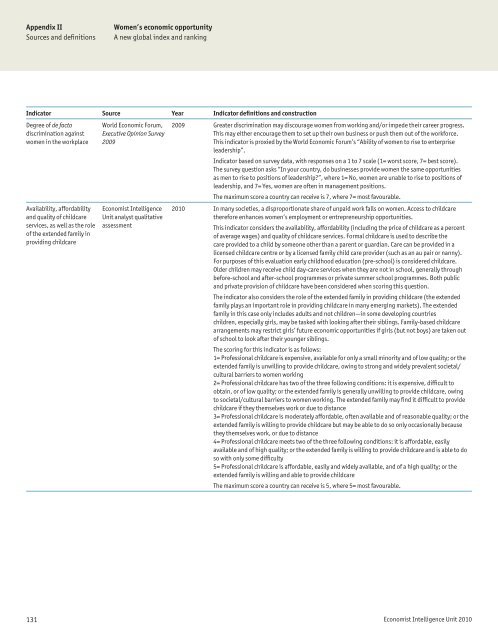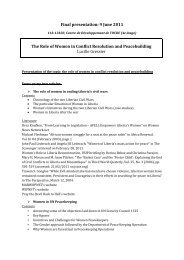Women's Economic Opportunity Index - Economist Intelligence Unit
Women's Economic Opportunity Index - Economist Intelligence Unit
Women's Economic Opportunity Index - Economist Intelligence Unit
- No tags were found...
You also want an ePaper? Increase the reach of your titles
YUMPU automatically turns print PDFs into web optimized ePapers that Google loves.
Appendix IISources and definitionsWomen’s economic opportunityA new global index and rankingIndicator Source Year Indicator definitions and constructionDegree of de factodiscrimination againstwomen in the workplaceAvailability, affordabilityand quality of childcareservices, as well as the roleof the extended family inproviding childcareWorld <strong>Economic</strong> Forum,Executive Opinion Survey2009<strong>Economist</strong> <strong>Intelligence</strong><strong>Unit</strong> analyst qualitativeassessment2009 Greater discrimination may discourage women from working and/or impede their career progress.This may either encourage them to set up their own business or push them out of the workforce.This indicator is proxied by the World <strong>Economic</strong> Forum’s “Ability of women to rise to enterpriseleadership”.Indicator based on survey data, with responses on a 1 to 7 scale (1= worst score, 7= best score).The survey question asks “In your country, do businesses provide women the same opportunitiesas men to rise to positions of leadership?”, where 1= No, women are unable to rise to positions ofleadership, and 7= Yes, women are often in management positions.The maximum score a country can receive is 7, where 7= most favourable.2010 In many societies, a disproportionate share of unpaid work falls on women. Access to childcaretherefore enhances women’s employment or entrepreneurship opportunities.This indicator considers the availability, affordability (including the price of childcare as a percentof average wages) and quality of childcare services. Formal childcare is used to describe thecare provided to a child by someone other than a parent or guardian. Care can be provided in alicensed childcare centre or by a licensed family child care provider (such as an au pair or nanny).For purposes of this evaluation early childhood education (pre-school) is considered childcare.Older children may receive child day-care services when they are not in school, generally throughbefore-school and after-school programmes or private summer school programmes. Both publicand private provision of childcare have been considered when scoring this question.The indicator also considers the role of the extended family in providing childcare (the extendedfamily plays an important role in providing childcare in many emerging markets). The extendedfamily in this case only includes adults and not children—in some developing countrieschildren, especially girls, may be tasked with looking after their siblings. Family-based childcarearrangements may restrict girls’ future economic opportunities if girls (but not boys) are taken outof school to look after their younger siblings.The scoring for this indicator is as follows:1= Professional childcare is expensive, available for only a small minority and of low quality; or theextended family is unwilling to provide childcare, owing to strong and widely prevalent societal/cultural barriers to women working2= Professional childcare has two of the three following conditions: it is expensive, difficult toobtain, or of low quality; or the extended family is generally unwilling to provide childcare, owingto societal/cultural barriers to women working. The extended family may find it difficult to providechildcare if they themselves work or due to distance3= Professional childcare is moderately affordable, often available and of reasonable quality; or theextended family is willing to provide childcare but may be able to do so only occasionally becausethey themselves work, or due to distance4= Professional childcare meets two of the three following conditions: it is affordable, easilyavailable and of high quality; or the extended family is willing to provide childcare and is able to doso with only some difficulty5= Professional childcare is affordable, easily and widely available, and of a high quality; or theextended family is willing and able to provide childcareThe maximum score a country can receive is 5, where 5= most favourable.131 <strong>Economist</strong> <strong>Intelligence</strong> <strong>Unit</strong> 2010




